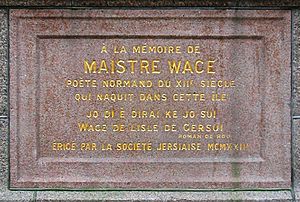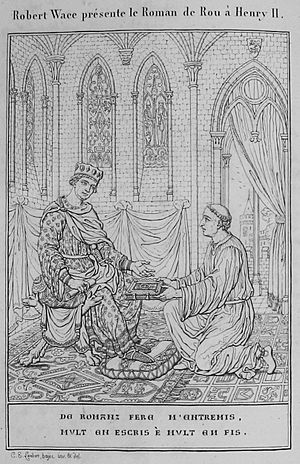Wace facts for kids
Wace (c. 1110 – after 1174) was a famous Norman poet from the Middle Ages. He was born on the island of Jersey and grew up in Normandy, which is part of France today. He later became a priest, known as a Canon, in Bayeux.
Contents
About Wace's Life
We know about Wace's life mostly from clues he left in his own poems. He didn't write down his exact birthday, but most people think he was born between 1099 and 1111.
Wace's name was just "Wace." Back then, people didn't always have last names like we do today. The name "Wace" was quite common in Normandy. It came from an old German name, "Wasso." People think Wace might have come from a wealthy family because he was sent to Caen for his education. This was something most people couldn't afford. Since he grew up on an island, he knew a lot about ships and the sea, which he sometimes wrote about.
Around 1130, Wace went back to Caen and started working for the church. He might have been a teacher there. We don't know exactly when Wace died. The last event he wrote about in his poem, Roman de Rou, happened in 1174. He also mentioned Henry the Young King as still being alive. Henry lived until 1183, so Wace probably finished his work before that year.
Wace's Famous Books
Wace wrote several important books, all in poetry. His most well-known works are the Roman de Brut and the Roman de Rou. He also wrote poems about the lives of saints, like Margaret the Virgin and Saint Nicholas.
The Roman de Brut
Wace wrote the Roman de Brut around 1155. This book was a long poem about the history of Britain. It was based on an earlier book by Geoffrey of Monmouth. Wace's poem wasn't a history book in the way we think of them today. But he often told his readers what he knew for sure and what he couldn't find out.
The Roman de Brut tells the story of how Britain was supposedly founded by Brutus of Troy. It then covers the legendary history of Britain that Geoffrey of Monmouth had written. This poem became very popular because it made the stories of King Arthur available to more people in their own language. Wace was the first writer to mention King Arthur's Round Table. He was also the first to call Arthur's famous sword by the name Excalibur. He added small details to Geoffrey's original stories.
The Roman de Brut later inspired other famous poems, like Layamon's Brut and Peter Langtoft's Chronicle. Wace knew a lot about how battles were fought in his time. So, the details he added to his stories can help us understand warfare from that period.
The Roman de Rou
Wace's later work, the Roman de Rou, was asked for by Henry II of England. A big part of this poem is about William the Conqueror and the Norman Conquest of England. This was when William led an army from Normandy to conquer England in 1066.
Wace mentioned that he heard stories from his own family about the Norman Conquest. This means his account of the preparations for the Conquest and the Battle of Hastings might have come from people who saw it happen. However, no eyewitnesses would have been alive when he started writing. The Roman de Rou also mentions the famous Halley's Comet appearing in the sky. This poem wasn't as popular as his other work. This might be because people became less interested in the history of Normandy after it became part of France in 1204.
Wace's Language
Wace wrote in a language that is now called Old Norman. This is a very old form of the Norman language, which is related to Old French. People in Jersey see Wace as the first important writer from their island. Sometimes, the language spoken in Jersey today, called Jèrriais, is even called "the language of Wace." But Wace lived before Jèrriais became a written language. Wace is the earliest known writer from Jersey.
Even though some people call him Robert Wace, it's generally believed that Wace only had one name. He was proud to be called "Maistre" (master), which meant he was a learned person. So, he is sometimes known as Maistre Wace.
There is a stone memorial to Wace in Jersey's Royal Square. It has a quote from his Roman de Rou that shows how proud he was of his home:
- Jo di e dirai ke jo sui
- Wace de l’isle de Gersui
This means:
- I say and will say that I am
- Wace from the Island of Jersey
See also
 In Spanish: Wace para niños
In Spanish: Wace para niños
 | John T. Biggers |
 | Thomas Blackshear |
 | Mark Bradford |
 | Beverly Buchanan |



